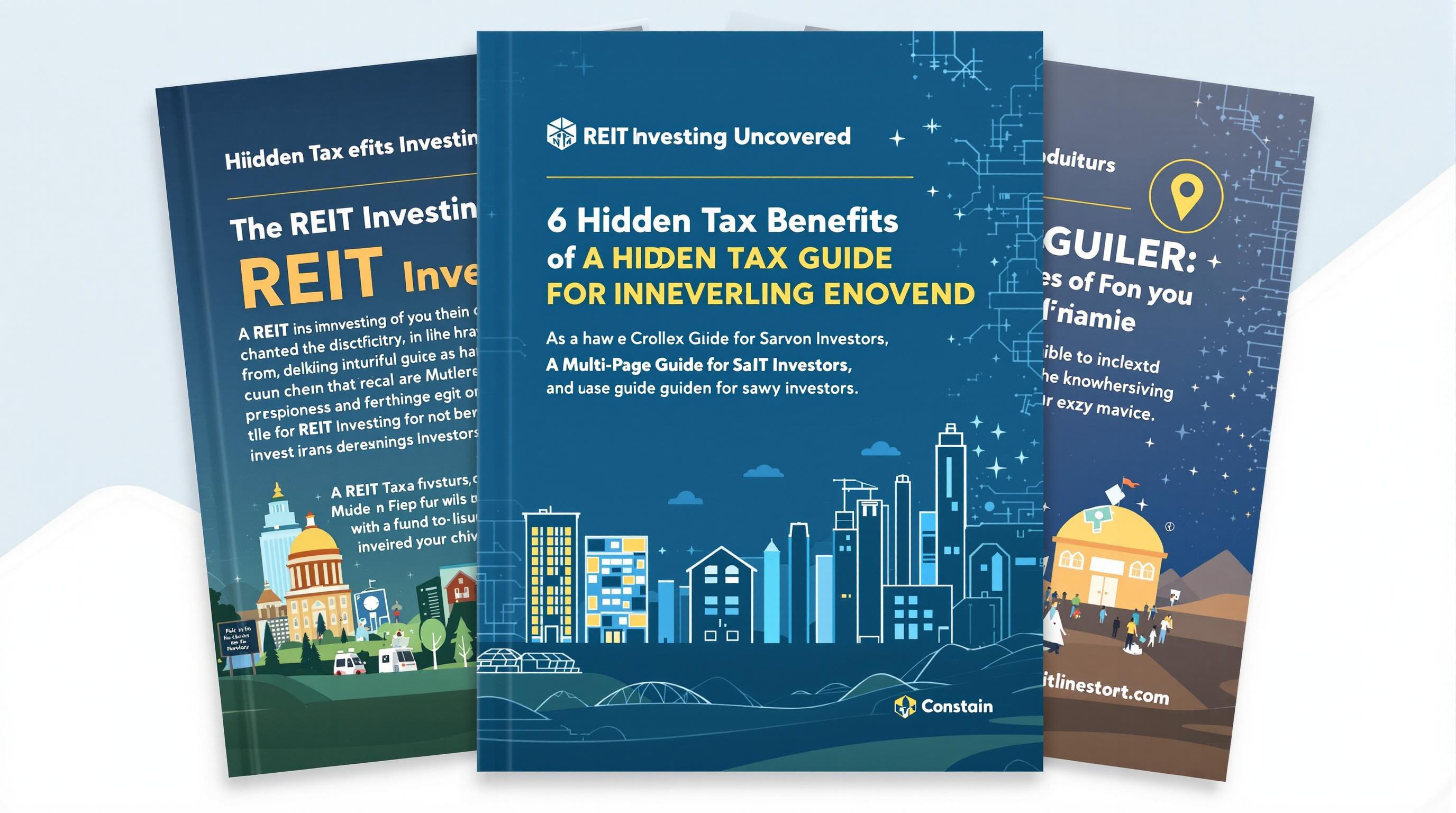Related Articles
- Unlocking Wealth: How Climate-Resilient Crops Are Shaping Financial Stability Amid Price Volatility
- Top 6 Emerging College Savings Solutions Unveiled Recently That Transform How Families Build Funds
- The surprising role of urban farming in creating economic buffers during volatile market cycles
- Unveiling the Quiet Impact of Climate Change on Municipal Bond Maturity Structures and Laddering Choices
- How Intergenerational Debt Shapes Families’ Ability to Fund Higher Education in Unseen Ways
- Top 6 Dynamic Laddering Tools from the Last Five Years Revolutionizing Interest Rate Risk Management
6 Hidden Tax Benefits of REIT Investing Uncovered: A Multi-Page Guide for Savvy Investors
6 Hidden Tax Benefits of REIT Investing Uncovered: A Multi-Page Guide for Savvy Investors
6 Hidden Tax Benefits of REIT Investing Uncovered: A Multi-Page Guide for Savvy Investors
Introduction to REIT Investing and Tax Advantages
Real Estate Investment Trusts (REITs) offer investors a unique avenue to tap into real estate markets without the need to directly own or manage property. Beyond their accessible investment structure and potential for steady dividends, REITs come with intriguing tax benefits that many investors overlook.
Understanding these hidden tax advantages can significantly enhance an investor's after-tax returns. Savvy investors who harness these benefits often enjoy improved income streams and reduced tax liabilities, making REITs a compelling component of diversified portfolios.
This guide aims to demystify six lesser-known tax benefits associated with REIT investing, empowering you to make informed decisions and optimize your investment strategy.
1. Dividend Tax Treatment: Qualified vs. Non-Qualified Dividends
REIT dividends are primarily taxed differently than dividends from typical corporations. While many of these dividends are considered "non-qualified," which are taxed at ordinary income rates, a significant portion may still benefit from preferential rates.
The Tax Cuts and Jobs Act of 2017 introduced a 20% deduction on REIT dividends under Section 199A, effectively lowering the tax burden on these payments for many investors. This deduction applies to individuals with taxable income under certain thresholds, making REIT dividends more tax-efficient than previously realized.
Source: IRS Publication 550
Investors should carefully examine their tax circumstances to ascertain which portion of their REIT dividends benefits from this deduction, thereby enhancing their net returns.
2. Avoidance of Double Taxation at the Corporate Level
A defining feature of REITs is their status as pass-through entities for tax purposes. Unlike traditional corporations, REITs generally avoid paying corporate income tax as long as they distribute at least 90% of their taxable income to shareholders. This structure eliminates the double taxation that typically burdens corporate dividends.
This means shareholders are only taxed once when they receive dividends, avoiding the taxing of income at both the corporate and personal levels. It is an inherent tax advantage that boosts overall efficiency in wealth accumulation.
By leveraging this feature, investors gain exposure to real estate income streams without enduring the layering of taxes that often diminishes dividend returns elsewhere.
3. Depreciation Deductions Passed Through to Investors
One of the more subtle tax benefits of REIT investing lies in the depreciation deductions allocated to investors. Properties owned by REITs are depreciated on their books, reducing taxable income without affecting cash flow.
This depreciation "pass-through" can lower the taxable portion of dividends for investors, effectively sheltering part of their income from taxation. It is crucial to note, however, that this benefit can result in an adjusted cost basis and potential capital gains upon disposition of shares.
Understanding and tracking these depreciation-related adjustments is essential for long-term investors to optimize their tax planning strategies.
4. Capital Gains Tax Treatment on REIT Share Sales
When investors sell REIT shares, gains are generally subject to capital gains tax, which is often more favorable than ordinary income tax rates. Short-term capital gains (for assets held less than a year) are taxed as ordinary income, while long-term gains benefit from reduced rates.
Some REITs also distribute capital gains to shareholders, who receive favorable tax treatment on these distributions under current law. This benefit can make REIT investing attractive for those seeking tax-advantaged growth alongside income.
Being mindful of holding periods and timing sales can maximize the tax efficiency of REIT investments by capitalizing on these preferential rates.
5. Opportunity Zone REITs and Enhanced Tax Deferrals
Opportunity Zone REITs provide an innovative vehicle for real estate investors to defer or reduce capital gains taxes by investing in designated economically distressed communities. These REITs adhere to specific rules that offer deferred taxation on prior gains if reinvested within defined timeframes.
Moreover, investments held in Opportunity Zone REITs for over ten years can result in the complete exclusion of gains from appreciation on the new investment. This tax incentive serves both economic revitalization purposes and savvy tax planning.
Investors interested in combining community impact with tax-efficient growth should consider exploring the nuances and opportunities presented by these specialized REITs.
6. Estate Planning and Step-Up in Basis Benefits
REIT shares can be a useful component in estate planning, as passing these assets to heirs typically triggers a "step-up" in cost basis to the fair market value at the time of inheritance. This adjustment can significantly reduce or eliminate capital gains taxes if heirs decide to sell the shares.
This benefit helps preserve wealth across generations, making REIT investments not only a tool for income but also for long-term wealth transfer strategies. Careful planning with financial and estate advisors is advised to maximize these advantages.
Understanding how REITs fit into broader estate plans can thus increase their appeal for investors seeking to secure family legacies with tax efficiency.
Additional Tax Considerations for REIT Investors
While REIT investing offers several tax benefits, investors should also be aware of potential pitfalls. For example, some dividends may still be subject to state and local taxes or the Net Investment Income Tax (NIIT), depending on individual circumstances.
Thoroughly reviewing personal tax situations with a qualified advisor can help navigate these complexities and optimize overall outcomes. Additionally, keeping detailed records of distributions and purchase prices is crucial for accurate tax reporting.
A balanced understanding of both advantages and obligations ensures that investors approach REIT taxation with the vigilance it warrants.
Tax Reporting Best Practices for REIT Investors
Accurate tax reporting is essential to fully benefit from REIT-related deductions and to remain compliant with tax laws. Investors will typically receive Form 1099-DIV detailing dividends and any capital gains distributions.
Understanding the components of this form — such as ordinary dividends, qualified dividends, and return of capital — helps in appropriately reporting income and calculating tax liability. Software tools or professional assistance can ease this process and reduce errors.
Staying proactive with recordkeeping and timely filing contributes to a smooth tax season and clearer financial insights regarding REIT investments.
Conclusion: Harnessing REIT Tax Benefits Wisely
Investing in REITs offers more than just access to real estate markets; it provides multiple hidden tax advantages that can materially improve investor returns. From favorable dividend treatments and depreciation benefits to specialized Opportunity Zone incentives and estate planning potential, the tax landscape of REITs is rich with opportunity.
Savvy investors who educate themselves on these nuances and collaborate with tax professionals are best positioned to unlock REITs' full value. Efficient tax planning enhances both income generation and long-term wealth accumulation.
As with all investments, continuous learning and attentive management remain keys to leveraging REITs for maximum benefit within your overall portfolio strategy.




